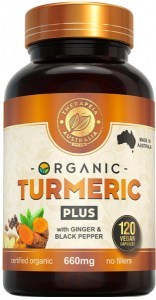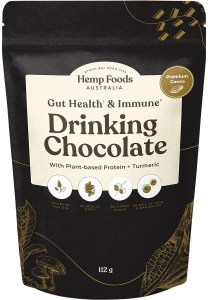Have you heard the saying ‘good health starts in the gut’? The truth is gut health plays a huge role in our general wellbeing. Experts say a healthy gut can improve your mood, promote healthy digestion, keep your immune system strong and so much more.
The gut is home to billions of microbes with the majority of them bacteria. And supporting the good bacteria in the gastrointestinal tract is key to good gut health. But how do we support the good bacteria and improve gut health naturally?
A healthy diet full of whole foods with a focus on fibre-rich foods, whole grains, and lots of fresh fruits and vegetables will go a long way on your journey to a healthy gut. Eating a healthy diet can help the good bacteria in your gut to flourish, which helps keep any bad bacteria lurking in the gut in-check creating equilibrium in the gut.
A great way to support your diet is with gut health supplements. They are a great way to fill any voids when the foods you consume can’t provide the balance your gut needs. Plus they’re an easy way to boost your gut microbiome with an array of options available.
Gut health supplements don’t have to be complicated, they can be as simple as a natural probiotic supplement or a daily dose of Swedish Bitters. Complimenting a healthy diet with natural health supplements can go a long way towards a healthy gut with a thriving community of good bacteria and a gastrointestinal tract that boasts a healthy gut microbiome.
If you’re looking for ways to improve gut health we’re sharing some of our favourite gut health supplements below.
Types of gut health supplements
Probiotics are living microorganisms, a type of friendly bacteria that can help maintain balance in the gut. Natural probiotic supplements typically contain multiple probiotic strains. Rochway’s Bio-Fermented Blueberry Concentrate uses fermented papaya and broad spectrum probiotics with a boost of antioxidants from a (delicious) trio of berries. It’s quite possibly the most delicious way to create a flourishing gut microbiome.
Apple cider vinegar with the ‘mother’ in tact is packed full of complex beneficial bacteria along with a host of enzymes and minerals thanks to the vinegar’s natural fermentation process. It’s also considered to have antimicrobial properties that can help fight bad bacteria in the gut.
Kefir is a natural probiotic and a popular gut health supplement. It’s a fermented milk drink and a potent source of beneficial bacteria including Lactobacillius, lactococcus, lauconastistoc and Saccharomyces. Nature’s Goodness Kefir provides a starter kit for you to make this gut-loving drink at home.
Considered a prebiotic, green banana resistant starch can help feed the beneficial bacteria in the gut and promote growth. A gut health supplement like Guthealth+ 3-in-1 Multifibre can go a step further; as a synbiotic blend that includes both prebiotics and probiotics it’s an efficient way to promote beneficial bacteria in the gut.
Papaya leaf is rich in digestive enzymes including the digestive enzyme papain, which is thought to help the body break down food and support healthy digestion. Rochway’s Bio-Fermented Papaya Leaf Concentrate not only helps support good digestion but is a good source of natural antioxidants. Papaya leaves are bio-fermented with six strains of probiotic bacteria to create a pleasant-tasting daily digestive-support supplement.
Psyllium husk is a natural source of soluble dietary fibre and is often used to help promote a healthy digestive system. But that’s not all it does. Psyllium husk is also beneficial for gut health, benefiting the microbiome by supporting regular bowel movements. It’s also a prebiotic, so it aids the growth of good bacteria and supports gut flora.
Digestive enzymes are important proteins needed to help break down food in the body - namely carbohydrates, fats, and proteins - so the body can absorb their nutrients. A lack of digestive enzymes can wreak havoc with your gastrointestinal tract. A supplement like GutAid Gut Rescue can help support the gut, using (vegetarian) digestive enzymes to aid digestion and ease discomfort associated with common digestive issues.
Inulin contains prebiotic fibre so it’s great for feeding all the friendly bacteria in your gut. And when your good bacteria are happy they work better, supporting proper digestion. This Inulin from Wonder Foods is Certified Organic and leaves nature alone to work its wonders. Inulin is neutral-tasting so it’s easy to incorporate into your diet via smoothies, baked goods, or in a cup of herbal tea.
Swedish bitters has a long history as a digestive aid, used as a herbal medicine to maintain a healthy gastrointestinal tract. It’s packed with bitter herbs, included for their rumoured natural benefits. Hilde Hemmes Herbals are one of the biggest sellers of Swedish Bitters with this tincture offering an easy way to incorporate the elixir into your diet.
Made from the Cyamopsis tetragonoloba plant, guar gum is a fibre-rich functional food. The fibre in guar gum is prebiotic soluble fibre making it an effective support for good gut health. It acts to aid healthy digestion, promote regularity, and support gut microflora.
In the gut charcoal is passive, acting as an inert material that passes through without being absorbed by the body. It does, however, attach any gases in the intestines making it a helpful supplement to relieve bloating and flatulence.
Turmeric has been used for centuries as part of Ayurvedic medicine with devotees choosing this vibrant yellow-orange root for a multitude of ailments including digestive woes. Therapeia Australia have captured organic turmeric powder in its whole form, with nothing added, nothing extracted, and no heat compromising its natural bioactive.
Disclaimer/note
Always consult a medical professional prior to altering your diet I any way, including introducing new health supplements. Seek advice from your child’s paediatrician prior to giving them any health supplements and/or probiotics; some probiotics aren’t suitable for premature infants.




